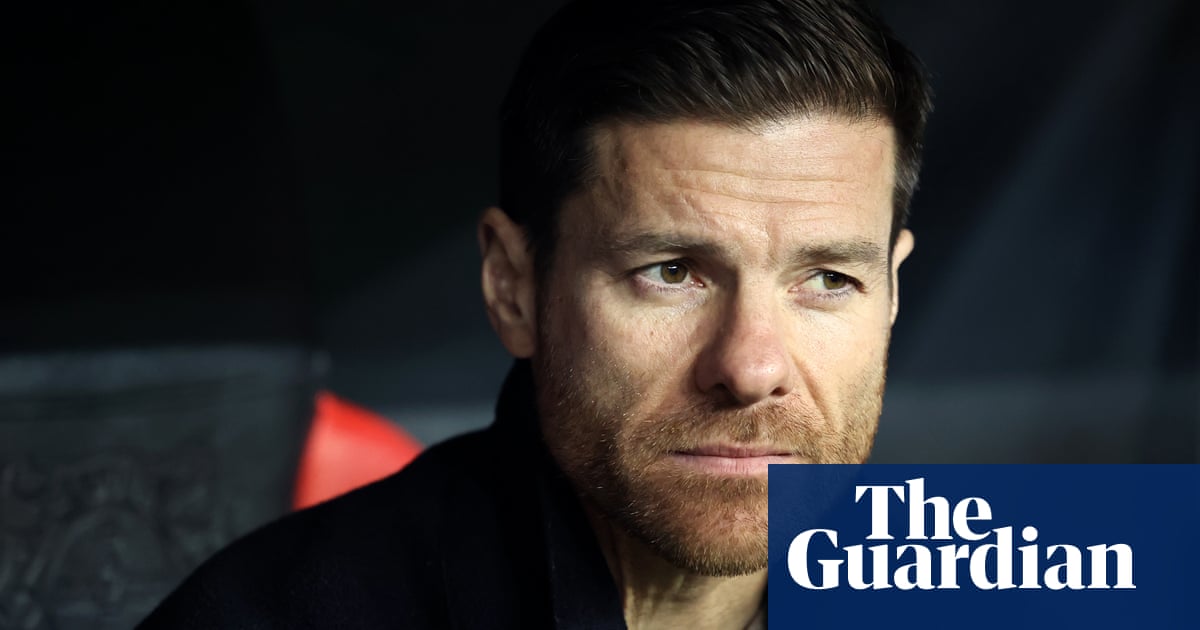
“I’m Basque, total Basque.” Xabi Alonso bristles as the thought that he could be defined as anything else, though there is a concession. He understands exactly how much Germany has shaped his current path, starting almost a decade ago when he arrived in the south of the country to begin a three-year spell with Bayern Munich that would see him through to retirement. “But with big German influence now,” he adds.
The Bundesliga’s – and perhaps Europe’s – hottest coach is calm and methodical, and though he must be aware of how extensively he is lauded, he appears to pay little mind to it. If it feels as if the production of Alonso the Coach is moving at breakneck speed – at least partly owing to the mesmeric power of his Bayer Leverkusen side’s football, as well as their excellent results – the man himself gives little to no impression of having been swept up in a frenzy.
For one, Leverkusen just isn’t that kind of place. A small, quiet city of 160,000 people, built on the chemical industry and now synonymous with the pharmaceutical company Bayer, it is squarely in the shadow of its big, brash older brother about 20 minutes to its south. Cologne is the most populous city in the North‑Rhine Westphalia region and despite its club, FC Köln, languishing way short of Leverkusen in almost every sporting success metric over the last 25 to 30 years, any sniff of success is met with a fervent, almost manic response.
Leverkusen, perennial qualifiers for European competition and Champions League finalists in 2002, operate on far more of an even keel. They are, one might argue, the perfect place to grow. A place to work, a place to be challenged, but not a place to be too closely under the microscope, and not a place to be put under unbearable pressure. The best of both worlds. It is certainly suiting Alonso to date. He arrived in October 2022 to find a squad assembled with European aspirations sitting second bottom of the Bundesliga table.
Fourteen months on he has guided his team to the summit. The club colloquially known as Neverkusen due to their habit of falling at the last hurdle – most famously letting the Bundesliga, DfB Pokal and Champions League slip from their grasp in an 11-day period in May 2002 – feel like they might be about to change their spots under their highly impressive 42-year-old coach, in his first senior top-flight post. After 13 Bundesliga games Alonso’s side are unbeaten, winning all but two of them (against Bayern and Borussia Dortmund) and thriving in domestic and continental cups. Their swagger and style are undeniable.
On the morning we get to spend 45 minutes with Alonso in a suite overlooking the BayArena’s pitch, he is perhaps less on-the-clock than usual, having led a small‑scale training session with half-a-dozen players, with the majority of his squad having left town immediately after the 4-0 demolition of Union Berlin to join their respective international teams for November’s matches. Yet he is good-humoured, relaxed and above all comfortable in his own skin.
Alonso is grateful too for the current situation, flying high and enjoying seeing his work hit the mark. The greatest satisfaction for him is not leading the league now, but “that we have a clear idea of how we want to play. It’s not let’s see what happens, it’s let’s try to make this happen.” It was not always so. It is easy to say now that Leverkusen was the perfect place for Alonso develop but when he arrived last year in a chilly autumn, with limited senior experience having left Real Sociedad’s B team and taking on a squad facing a relegation battle that looked as if it might not have the stomach for it, it looked far from a utopia.
There were hairy moments, not least a 5-1 beating at Eintracht Frankfurt in his second game, but a change was quickly apparent. After a derby win at Köln last November, the middle one of three successive wins that guided them into the World Cup-induced early winter break, the club’s sporting director Simon Rolfes told me that Alonso’s ability to convey his ideas to his new charges from day one – quickly, simply and clearly – had absolutely blown him away.
“I had the approach that there was a big potential,” the coach says. “I was not given the expectations that we need to reach Europe. The [idea of the] moment was, we need to get better. We didn’t know if that was 10th place, not having problems, reaching Europe.
“I knew the potential the team had. You get to know the players, to start to create some confidence and commitment from them. That’s the manager’s job. At the beginning the results were not the best but I had the feeling that a big part of the group was committed to change things, especially in the defensive part. At that moment we had many problems, we were not very solid and we put a lot of focus on that, more than our controlling, possession style.”
That came later. “Those were not the principles that we started working at a year ago,” he continues. “We started with the basics and from there we started being competitive, more than controlling.”
Understanding what one can and can’t control might be the key to Leverkusen’s current success, but it is not something we ever imagined Alonso the player having to deal with. He could control it all, the most poised of midfield players. A light moment on Bayern’s 2016 US tour inadvertently underlined this, as he and his teammate Arturo Vidal played a match against 40 children in New York city, on a pitch by the banks of the Hudson. At his most playful, he had a surgeon’s eye when working the ball. He always set the agenda, moving to the beat of his own drum.
Still now on the training field, Alonso moves the ball with the grace and accuracy of old. Is he still the best passer at the club? “Well,” he grins over a pause, “there are some good ones.” Even in the maelstrom of the coaching world, he is determined to do the same as he always did. With Carlo Ancelotti widely tipped to join Brazil at the end of the season, intense speculation has suggested that the next time Real Madrid tour the US Alonso might be in situ as his replacement, even if he is less likely to be giving kids a possession masterclass or shooting hoops with Boogie Cousins next time. Yet there is no fluster, no obfuscation – and no rush to leave Leverkusen, it appears.
“It depends on if you want to be pushed to take other people’s decisions,” he says, “or if you want to make your own decisions. And so far I’ve been clear. I will take my own decisions when I feel it is the right moment for whatever. So that’s going to happen for sure.”
That is the same thought process that led Alonso to Leverkusen in the first place. Though he insists there is no grand plan for his coaching career, he was guided by “an idea that I didn’t want to go too quickly. After that it’s a little bit of intuition, a connection with the right moment in the right place.”
Another club in the north‑west of Germany, Borussia Mönchengladbach, had hoped to bring Alonso in 2021, while Bayern have not been coy over their continued interest in him over the years. “Previously I had other possibilities,” he admits, “but I didn’t see that clearly. That’s why I didn’t want to go anywhere where I was not convinced. I took this chance and I’m really pleased that Leverkusen gave me the chance. Now we are here, I don’t map out [from there] too much to be honest.”
Leverkusen may habitually play like they are in a hurry, but their coach is not. It’s not quite slow and steady wins the race, but Alonso’s quiet confidence in his ability means he knows he will reach elite level – quite possibly during his time at Leverkusen, as well as later down the line. As with his passing, it’s just a matter of timing.












